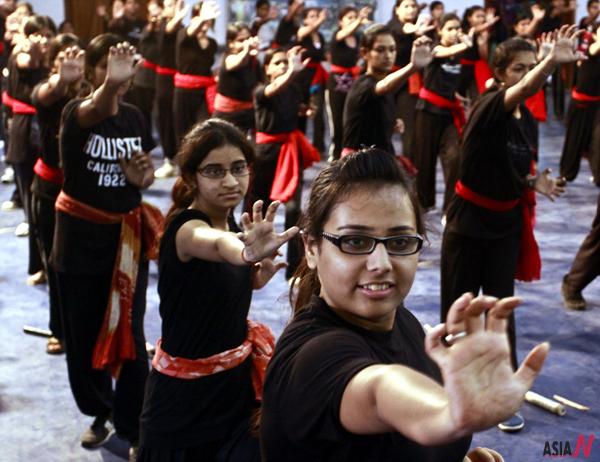Indian gov’t plans to promote menstrual hygiene hampered

Students of a Government college participate in a martial art and self defence training camp during "Mission Prahar" campaign in Bhopal, capital of Madhya Pradesh, India on September 10, 2011. (Photo DB: Xinhua)
The Indian government’s plans to promote menstrual hygiene among the adolescent girls by making subsidized sanitary napkins available in Indian-controlled Kashmir seems to have gone slack, with major portion of the supplied stocks lying unused.
The region’s Health Minister Sham Lal Sharma said scheme has been initiated in 10 districts of the region – Baramulla, Bandipora, Kupwara ,Kathua, Udhampur, Poonch, Rajouri, Doda, Kishtwar and Ramban to raise awareness about menstrual hygiene among young women.
“The scheme has been initiated to increase awareness among adolescent girls about menstrual hygiene and increase accessibility of high quality sanitary napkins at affordable cost, especially for girls in rural areas,” a government spokesman said.
The girls in the age group of 10 to 19 years in these districts are being provided a pack of six napkins for INR 6 under Indian Government’s National Rural Health Mission(NRHM) for promotion of menstrual hygiene.
However, a major portion of the supplied sanitary napkins to district officials are lying unsold.
As per available data, in three districts of Baramulla, Bandipora and Kupwara, 457,000 sanitary napkins were supplied, of which only 116,598 napkins were sold.
Authorities who are finding it difficult to raise these issues in conservative Kashmir society are now contemplating ways and means to sell out the remaining stocks.
“The scheme is likely to get a boost after reopening of the schools,” said deputy commissioner Bandipora Manzoor Ahmad Lone. “The teachers of girls’ schools and female Panchs (village body members) should also be actively involved, so that the distribution of napkins is monitored.”
Doctors say chances of reproductive tract infections are usually high in the rural areas, owing to the poor menstrual hygiene.
Health experts say due to lack of awareness on managing menstruation and absence of affordable sanitary napkins, women in rural areas and from poor families are forced to use rags during the menstrual cycle. Doctors say such practices and the resultant poor hygiene are the reasons for the high incidence of reproductive tract infections among women.
In India, menstruation and menstrual practices of women has a taboo attached to it and owing to cultural restrictions the issue is not discussed openly.
Women activists say the taboos surrounding the menstruation in society prevent girls and women from articulating their needs and therefore problems of poor menstrual hygiene management have been ignored or misunderstood.
Naseema Akther is an officer with social welfare department in Anantnag. She says limited access to safe sanitary products and facilities is believed to be the reason for ill-health of young females that often results in low attendance at girls’ schools, ultimately contributing to dropout rates.
Experts say every girl from age of 12 to 40, spends approximately 2,100 days menstruating which is equivalent to almost six years of her life.
The NRHM scheme to promote menstrual hygiene in rural areas is being implemented in India’s more than 150 districts.
According to a recent survey “Sanitary Protection: Every Woman’ s Health Right”, undertaken by AC Nielsen in India, only 12 percent of India’s 355 million menstruating women use sanitary napkins.

























































